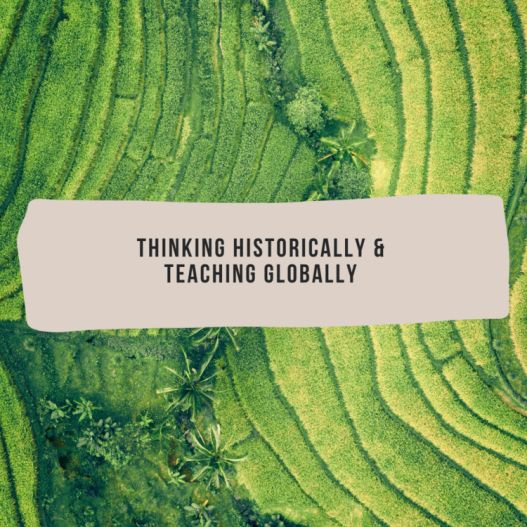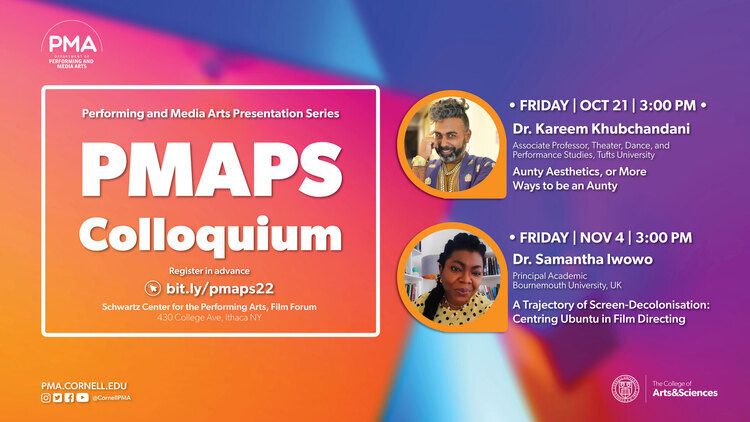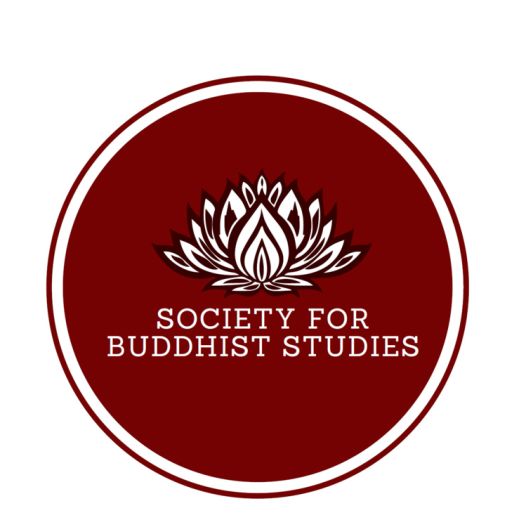South Asia Program
Thinking Historically & Teaching Globally

November 8, 2022
2:00 pm
Historical thinking is one of the most critical skills a college student can acquire. Teaching globally is a vital approach to understanding our contemporary world.
How do we combine the resources available to us from archives, libraries, and online collections to inform our understanding of the past and the present? In this workshop we collaborate across the expertise of librarians and historians to further conversations about teaching, history, and library materials.
Are you a post-secondary educator seeking to build connections across the State of New York? Are you faculty looking for more primary source materials? Are you interested in learning more about how to access materials from libraries at a distance? Are you a graduate student in need of resources and source materials as you construct current and future syllabi? If you have answered "yes" to any of these questions, then please do join us!
This online workshop is sponsored by the Mario Einaudi Center for International Studies, with funding support from the U.S. Department of Education Title VI NRC Program.
Speakers:
Emily Zinger, Southeast Asia Digital Librarian, Cornell University
Dr. Joshua Kueh, Reference Librarian, Asian Division, Library of Congress
Dr. Michitake Aso, Associate Professor, Department of History, SUNY-Albany
Moderator: Dr. William Noseworthy
Additional Information
Program
Einaudi Center for International Studies
Southeast Asia Program
Latin American and Caribbean Studies
Institute for African Development
South Asia Program
PMAPS Colloquium: Aunty Aesthetics, or More Ways to be an Aunty, a talk Dr. Kareem Khubchandani

October 21, 2022
3:00 pm
Schwartz Center for Performing Arts, Film Forum
Aunty Aesthetics, or More Ways to be an Aunty, a talk Dr. Kareem Khubchandani
Friday, October 21st, 3:00 p.m. - 4.30 p.m. , Film Forum and on Zoom
Description:
Aunties are known to be terrifying figures, domineering and difficult, overbearing to younger generations. They are especially known for managing and curtailing desire, whether shaming you for that extra piece of cake you are eyeing, or blabbing to your parents about your nighttime escapes. As such, they have become the butt of the joke, particularly in meme culture that critiques older generation's outmoded style and politics. This talk revisits the hegemonic figure of the South Asian aunty in performance, TV, literature, and visual culture to detail what paying attention to her aesthetics can teach us about the queer and trans futures she makes possible rather than forecloses.
Kareem Khubchandani is Associate Professor in theater, dance, and performance studies at Tufts University. He is the author of Ishtyle: Accenting Gay Indian Nightlife (University of Michigan Press, 2020), co-editor of Queer Nightlife (University of Michigan Press, 2021), and guest editor of the "Critical Aunty Studies" special issue of Text and Performance Quarterly.
Additional Information
Program
Einaudi Center for International Studies
South Asia Program
Symposium on 20th Century Indian Buddhism

December 2, 2022
12:00 pm
Please join the Society for Buddhist Studies for our inaugral symposium on 20th century Indian Buddhism.
The Symposium will feature short papers by Anand Venkatkrishnan (University of Chicago), Padma D. Maitland (California Polytechnic State University), and Douglas Ober (University of British Columbia), followed by a discussion and Q&A session.
This event is co-sponsored by the GPSA-FC and the Department of Asian Studies, and is open to all interested.
Additional Information
Program
South Asia Program
Refugee Cities: How Afghans Transformed Pakistan

November 21, 2022
11:00 am
Talk by Sanaa Alimia in conversation with Aziz Hakimi
In this talk, Sanaa Alimia will discuss her new manuscript, Refugee Cities: How Afghans Transformed Pakistan (University of Pennsylvania Press, 2022). The book is a people's history of displacement across Afghanistan and Pakistan. Weaving together microhistories of neighbourhoods in Peshawar and Karachi, Alimia shows how Afghans have claimed and accessed rights and resources in these cities. Their struggles, which are a crucial, neglected dimension of Pakistan's urban history, reflect how Pakistan's longer-term Afghan population is not an alien cohort waiting to go home but rather an essential part of Pakistani society.
Sanaa Alimia is an Assistant Professor of Political Science at the Aga Khan University, Institute for the Study of Muslim Civilisations. She is a recipient of the British Academy/ Leverhulme Small Grants Award for her research project, 'Digital Borders, Bodies, and Mobility in South Asia.' Alimia’ s manuscript, Refugee Cities: How Afghans Transformed Pakistan, is out in 2022 (University of Pennsylvania Press). Alimia has previously held positions at the Leibniz Zentrum Moderner Orient, Berlin (2014-2019), Department of Political Science, University of Peshawar (2013-2017), and SOAS, London (2011-2014).
Aziz Hakimi holds a PhD in Development Studies from SOAS-University of London. His research and publications have addressed subjects including war and state formation, policing and local militias, and the intersections between gender, legal reform, marriage practices and migration in Afghanistan and among Afghan diaspora in Turkey.
Between 2016-2019, Dr. Hakimi was co-director of the New Afghan Men? Marriage, Masculinities and Gender Politics in Afghanistan research project. It was a collaborative initiative between Chr. Michelsen Institute (Norway), University of Sussex (UK) and Peace Training and Research Organization (Afghanistan). The project was funded by the Research Council of Norway (RCN) and explored the changing notions of masculinity and marriage practices in contemporary Afghanistan.
Additional Information
Program
Einaudi Center for International Studies
South Asia Program
Reppy Institute for Peace and Conflict Studies
Global Grand Challenges Symposium: Frontiers and the Future

November 17, 2022
8:00 am
How will we meet the most pressing demands of our time?
Join us for a two-day symposium that brings together the Cornell community and international partners to discuss the most urgent challenges around the world and how we can work together to address them.
Building on the first Global Grand Challenge, Migrations, symposium participants will help identify the next university-wide research, teaching, and engagement initiative to harness Cornell's global expertise.
The symposium, hosted by Global Cornell, will focus on five interdisciplinary themes, with panelists bringing their research and perspectives to bear:
Knowledge | Water | Health | Space | International Collaboration
Register today!
If you can't attend in person, please join us virtually:
Day 1: Wednesday, Nov. 16Day 2: Thursday, Nov. 17
Wednesday, November 16
Welcome: President Martha Pollack
Panel 1: Knowledge: What Counts, for Whom, and to What Ends?
4:30–6:00 ET, Klarman Hall, Rhodes-Rawlings Auditorium
A panel of Cornell faculty and Global Hubs partners discuss innovations in higher education, social media, and legal frameworks; new forms of knowledge production and inequalities in access; and security, privacy, disinformation, and the role of knowledge in democracies.
Read about the panelists.
Remarks, Provost Michael Kotlikoff
Reception, 6:00 ET, Klarman Hall Atrium
Thursday, November 17
8:00–5:00 ET, Clark Hall, room 700 (7th floor)
Breakfast, 8:00 ET
Panel 2: Water: Worldwide Challenges and Approaches
9:00–10:30 ET
Faculty from Cornell and partner universities explore the most critical challenges related to changing global water conditions, including access to clean drinking water; water governance, norms, and customs; trade-offs between drinking water, irrigation, and hydropower; rising sea levels and water-dependent communities; and new solutions for wastewater, ocean plastics, and pollution.
Read about the panelists.
Panel 3: Health: An Integrated Global Perspective
11:00–12:30 ET
Faculty from Cornell and partner universities explore vital issues related to health, including equity, nutrition, mental health and well-being, disease, communication, new technologies, sociocultural norms, One Health, sustainable agriculture and ecosystems, elder care, and the business of medicine/health.
Read about the panelists.
Lunch, 12:30 ET
Panel 4: Space: In a Galaxy Not So Far Away
1:30–3:00 ET
Faculty from Cornell and partner universities explore urgent topics related to our global engagements with outer space, including intergovernmental collaboration and defining a new space policy; private space travel and exploration; historical lessons for colonization; new technologies, materials, and visualizations; intelligent life; resources and extraglobal markets; and access and inequalities.
Read about the panelists.
Panel 5: International Collaboration:< /b>Taking Action for Our Global Future
3:30–5:00 ET
In this final session, panelists discuss opportunities and challenges for creating truly collaborative and mutually beneficial partnerships in an unequal world. Faculty from partner universities share ideas for collaborating on the four themes introduced earlier in the symposium, and participants explore the tension between respect for local cultures and universalisms implicated in scientific inquiry.
Read about the panelists.
Register in-person or virtually for one or all sessions!
Additional Information
Program
Einaudi Center for International Studies
Reppy Institute for Peace and Conflict Studies
East Asia Program
Southeast Asia Program
Latin American and Caribbean Studies
Institute for African Development
Institute for European Studies
South Asia Program
"The Disappearance of the Dharma"

November 11, 2022
12:00 pm
Please join the Society for Buddhist Studies for a talk by Andrew Ollett (The University of Chicago).
Buddhist and Jain traditions saw their teachings as part of a “dispensation” (tīrtha in Jainism) that has both a beginning and an end. This is in absolute contrast to dominant self-perceptions of Brahmanical traditions as eternal. Buddhists and Jains, moreover, imagined the precise circumstances in which their teachings would disappear from the earth. In the ineluctable process of disappearance, there will always be external factors: society, the state, religious institutions, and most of all the environment can change in ways that are unpredictable and not conducive to the continuation of the teaching (sāsanassa pavēṇī). But disappearance of a teaching means its disappearance from a continuous chain of oral transmission and memory, and over these factors, even in adverse circumstances, the bearers of the tradition remain responsible. This talk focuses on Buddhaghōsa’s commentary on Aṅguttaranikāya II.41.
This event is co-sponsored by the GPSA-FC and the Department of Asian Studies, and is open to all interested.
Additional Information
Program
South Asia Program
LGBTQ+ History Month Speaker: Trans Rights in India with Kalki Subramaniam

October 13, 2022
6:00 pm
Goldwin Smith Hall, G142
The LGBTQ+ Resource Center would like to invite all to attend our LGBTQ+ History Month speaker event with Kalki Subramaniam. This event is a collaborative effort with Evergreen Story and Desi Rainbow to bring one of the most recognized Indian transgender activists of our era to campus. Kalki is the founder of the Sahodari Foundation, an organization that works for the social, political, and economic empowerment of transgender people. She is also an artist, poet, actor, Ted Speaker, and inclusion catalyst. We hope that you will join us for her keynote to learn more about what inclusivity means from an Indian context, the history of gender spectrums from Ancient India, and the power of art and writing for social change.
Additional Information
Program
South Asia Program
The Dollar Is Strong. That Is Good for the U.S. But Bad for the World.

Eswar Prasad, SAP
“For the rest of the world, it’s a no-win situation,” says Eswar Prasad, professor of applied economics and policy. “Any delay in action could make things potentially even worse.”
Additional Information
Einaudi Welcome Reception

150 Guests Celebrated Einaudi's Impact
The Einaudi Center's annual reception on October 3 connected faculty, staff, campus leaders, and friends from across Cornell.
The Einaudi Center welcomed 150 guests to Uris Hall Terrace for a fall gathering celebrating Einaudi's vibrant intellectual community. The well-attended event brought together affiliated faculty and faculty new this year to Cornell in numbers not seen since 2019. Their research interests and expertise span the globe. Learn more about Einaudi's regional and thematic programs and initiatives.
The attendees enjoyed a sunny afternoon with a playlist of world music from Einaudi's own Daniel Bass, South Asia Program manager and Monsoon Radio DJ.
“The Einaudi Center's transnational perspective, the diversity and depth of our faculty expertise, and the range of our partnerships drive innovative collaborations and let us see new solutions.”
Einaudi Center director Rachel Beatty Riedl kicked off the event with remarks highlighting the center's core commitments: collaborations that advance knowledge, advocacy and thought leadership to inform global publics, and teaching and learning that open doors to new worlds.
Riedl highlighted a range of ways for faculty to get involved, including applying for Global Public Voices (due October 13) and exploratory seed grants with Cornell Global Hubs partners (due October 21).
She invited attendees to join Einaudi, the Cornell community, and representatives from Global Hubs around the world at the Global Grand Challenges Symposium: Frontiers and the Future on November 16–17. Register for the symposium.
Additional Information
RRR

October 30, 2022
4:00 pm
Willard Straight Theatre
2021 > India > Directed by S.S. Rajmouli
With N.T. Rama Rao Jr (Jr NTR), Ram Charan, Ajay Devgn
An action-packed spectacular that mythologizes two real-life freedom fighters who helped lead India's fight for independence from the British Raj: Komaram Bheem (Jr NTR) and Alluri Sitarama Raju (Ram Charan). RRR imagines a fictional meeting between the two fighters amid staggeringly choreographed action sequences and an all-timer of a musical number. Screening with an intermission. Subtitled.
3 hrs 1 min
Additional Information
Program
Einaudi Center for International Studies
South Asia Program
